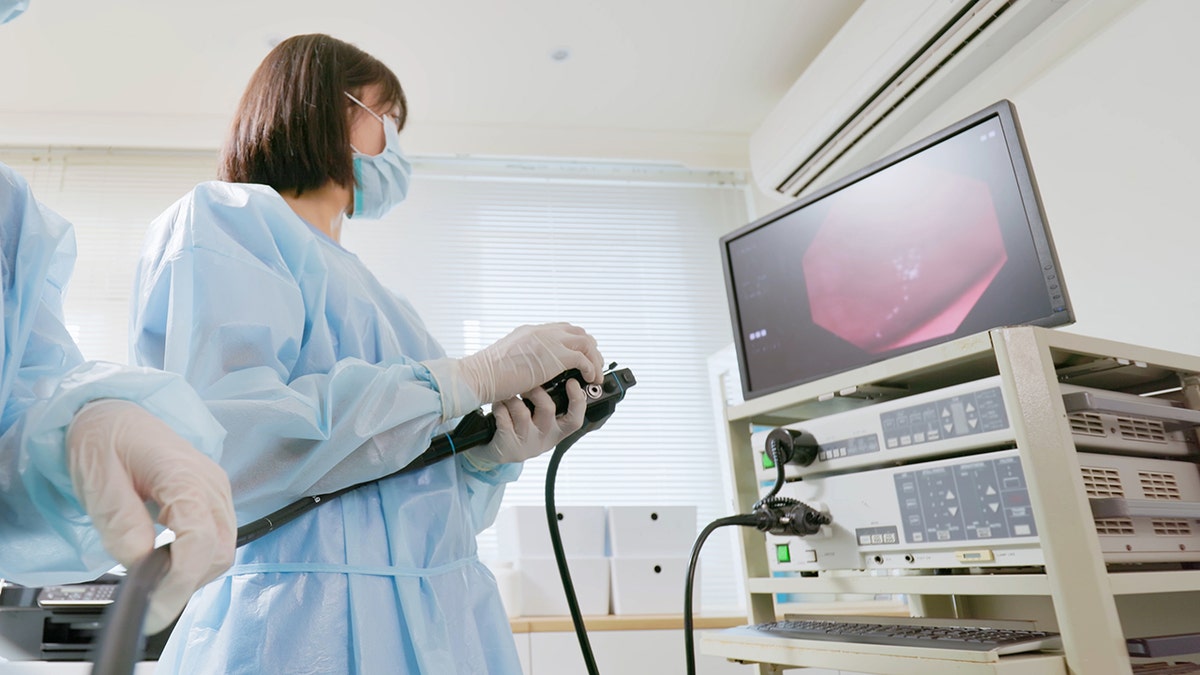NEWYou can now listen to Fox News articles!
Updated cancer screening guidance has reportedly caused a spike in diagnoses among younger Americans.
According to two studies by the American Cancer Society (ACS), there’s been a recent surge in colorectal cancer in people aged 45 to 49.
ACS scientists found that after 15 years of stable colorectal cancer (CRC) trends, U.S. diagnoses of local-stage disease skyrocketed in this age group from 2019 to 2022 — including a 50% relative increase from 2021 to 2022.
PROSTATE CANCER SCREENING AFTER 70: EXPERTS QUESTION GUIDANCE AFTER BIDEN’S DIAGNOSIS
“It is promising news, because the uptick in cases is likely due to first-time screening in the wake of new recommendations for younger, average-risk adults to begin testing for colorectal cancer earlier,” lead author Elizabeth Schafer, an associate scientist and cancer researcher at ACS, commented in a press release.
In 2018, ACS lowered the recommended age for CRC screenings from 50 to 45. The United States Preventive Services Task Force (USPSTF) enforced the same guidance in 2021.
In the first study, published in the Journal of the American Medical Association (JAMA), the researchers analyzed CRC diagnoses from 2004 to 2022 among adults aged 20 to 54, sorted by age, location and stage at diagnosis.
‘WESTERN DIET’ BLAMED FOR GROWING RISK OF GI CANCERS AMONG YOUNG ADULTS
Diagnoses have increased by 1.6% each year since 2004 in the 20 to 39 age group, and by more than 2% annually since 2012 in those aged 40 to 44 and 50 to 54.
A 1.1% annual increase in people 45 to 49 years old accelerated to 12% per year from 2019 to 2022.

The ACS confirmed the increase was driven by the detection of local-stage tumors, which increased by nearly 19% each year for colon cancer and more than 25% for rectal cancer in that timeframe.
Before this period, colon cancer detection rates had been stable, and rectal cancer detection rates had been declining.
RARE CANCER DIAGNOSES SURGE DRAMATICALLY AMONG MILLENNIALS AND GEN X
Advanced-stage disease also continues to steeply increase, ACS reported, rising from 1.7% to 2.9% annually since 2004 among adults under 45 and “even more rapidly” in the past 10 years in those aged 45 to 54.
These findings led to another ACS study, also published in JAMA, which found that CRC screening among U.S. adults between 45 and 49 increased by 62% from 2019 to 2023.
The scientists analyzed the data of more than 50,000 individuals to compare changes in screening. They found that CRC screening, which was at 20% in 2021, jumped to 37% in 2023.
Among 45- to 49-year-olds, colonoscopy screening increased by 43%, and stool-based testing increased more than five times from 2019 to 2023.
Lead author Jessica Star, associate scientist at ACS in Atlanta, considers it “thrilling” to see this increase in screening among younger individuals, as it’s likely linked to earlier-stage diagnoses.
“However, we still have a long way to go,” she said in the release. “Screening for colorectal cancer in ages 45 to 49 remains suboptimal, and has not increased equitably by both educational attainment and insurance status.”

Paul E. Oberstein, M.D., medical oncologist and assistant director of the Pancreatic Cancer Center at NYU Langone Perlmutter Cancer Center, said the increase in screening is “successful in detecting more cancers at an early stage where the chance of cure is very high.”
CLICK HERE TO SIGN UP FOR OUR HEALTH NEWSLETTER
“This ultimately should mean that fewer people are diagnosed later in life and fewer people have advanced colon cancer,” Oberstein, who was not involved in the study, told Fox News Digital.
“This study reinforces the need to focus research on understanding the causes of colon cancer increases – and possible steps to reduce these cases.”

The rate of colon cancer in those under 45 remains “substantially lower,” he noted, “so it is not clear yet if universal screening at a younger age is beneficial.”
Some specific patients who are younger than 45 may benefit from earlier screening, however, such as those with a family history or personal risk factors, the oncologist added.
EXERCISE PROGRAM REDUCES COMMON CANCER RECURRENCE AND BOOSTS SURVIVAL
As colon cancer continues to increase in younger individuals, Oberstein recommends contacting a doctor if any concerning symptoms are noticed.
Dr. Craig Eagle, chief medical officer of Guardant Health in California, added that early detection is “crucial,” noting that the five-year survival rate for CRC is over 90% when the disease is caught in early stages.
For more Health articles, visit www.foxnews.com/health
“[This] plummets to 13% in late stages when symptoms usually appear,” Eagle, who also was not involved in the research, told Fox News Digital.
“The rise in diagnoses for those in their 40s is an alarming reminder that screening must be easier and more accessible to reach the 50 million Americans who remain unscreened.”
Read the full article here










